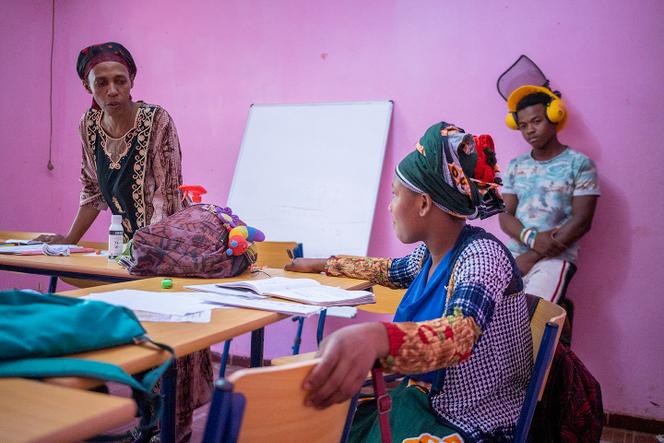


On the morning of October 2, Isaac, 5, was not concentrating on his coloring. While he was lying on a mat, with his feet in the air and crayons in hand, three of his classmates were almost finished. "He's usually one of the first to finish and likes to show off," smiled Allaouyat Bacar, his teacher, wearing an elegant boubou in shades of indigo.
Like many children of undocumented parents, Isaac's first day of school wasn't in an actual school, but in a classroom run by the Le Village d'Eva organization, which, in 2022, welcomed 840 unschooled children at its four sites, like some 15 other organizations in Mayotte. The local authorities of the town of Koungou, in the north of Mayotte, told Isaac's Comorian parents that there was no room in any kindergarten, but they then heard about the association by word-of-mouth. "Isaac is beginning to speak a little French," said a delighted educator in the middle of a room decorated with paper strips to encourage memorizing letters, numbers and colors. "He arrived in April with an uncle. His parents had already moved to Mayotte. During a sports session on the beach, he saw a boat and told us how he arrived by kwassa-kwassa," which is the name of these rapid fishing canoes.
In this French territory in the Indian Ocean, "more than 15,000 children" have no access to conventional schooling, warned Claire Hédon, the Defender of Rights, in September. A study by the Université de Paris-Nanterre, published in February, estimated that between "5,379 and 9,575" of these children, aged between 3 and 15, were not in school although they were entitled to be. On an island where almost 50% of the population is under 18, and where the population is growing by just under 4% a year, schools are overcrowded. At the start of the 2022 school year, 112,196 pupils were enrolled, including 54.2% in primary schools. This is a record figure in this overseas department of France. This figure represents 3.9% more students than in 2021.
These unschooled children belong to the territory's most vulnerable populations, the result of illegal immigration from the Comoros, Madagascar and the African Great Lakes region. These families live in the many shantytowns on the island's slopes, often without water or electricity. For years, the lack of space has led nearly 40% of schools to operate on a "rotation" basis: half the pupils come in the morning, the other half in the afternoon.
"Many towns are blocking the enrolment of children from illegal immigrant families, even though the law requires all children to attend school," said Bruno Dezile, general secretary of the CGT Educ'action teachers' union in Mayotte. Priority is given to pupils from Mayotte, whose parents are constantly protesting against the overcrowding of all public services, pointing the finger of blame at illegal immigrants. "Some towns ask foreign parents for documents they can't provide, whereas a sworn statement can suffice," criticized Anne Scheuber, deputy director of the organization Mlezi Maore ("Taking care of Mayotte"). "The problem is that these children are sometimes not even put on the waiting list." It can be as if they didn't exist. "These children don't appear on our radar," confirmed Benjamin Lazard-Peillon, the education office's chief of staff. "That's why it's so hard for us to keep track of them. The other reason is the arrival of new pupils throughout the year."
You have 60% of this article left to read. The rest is for subscribers only.
